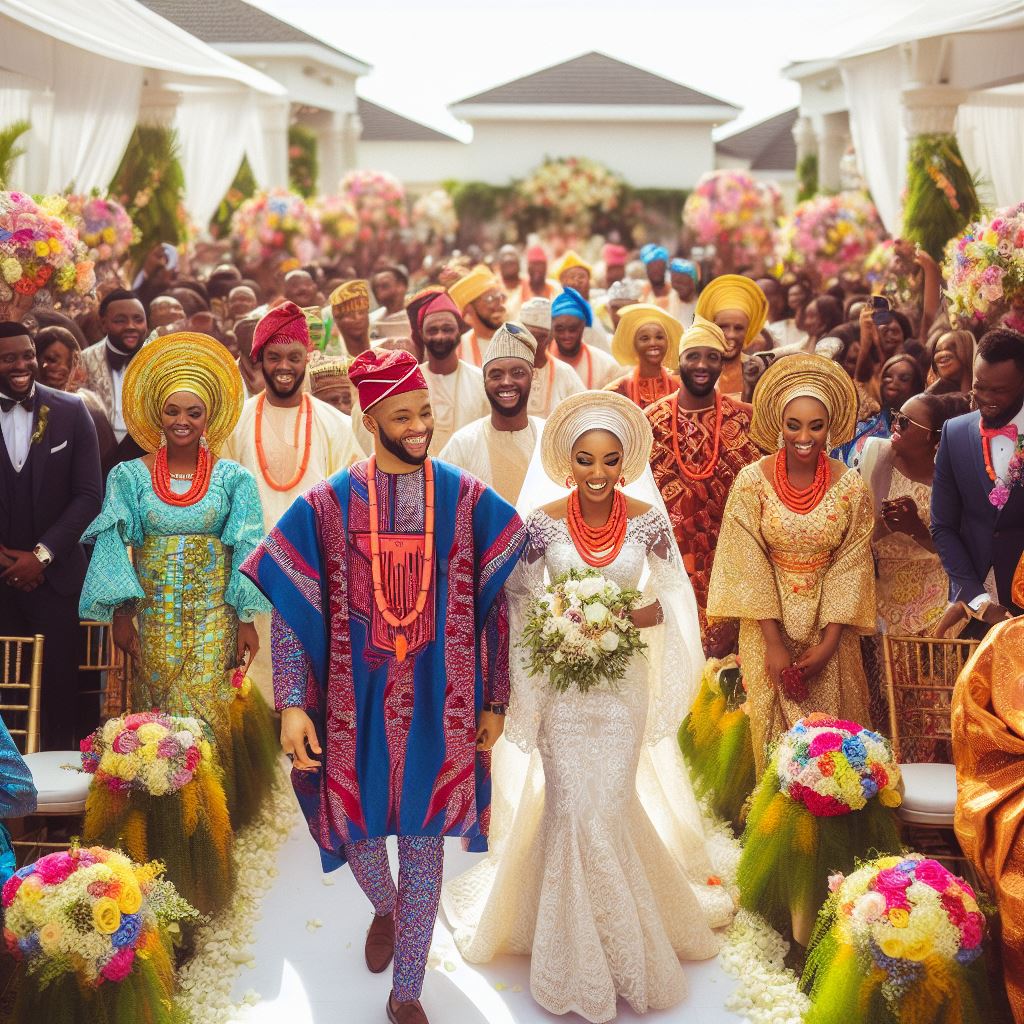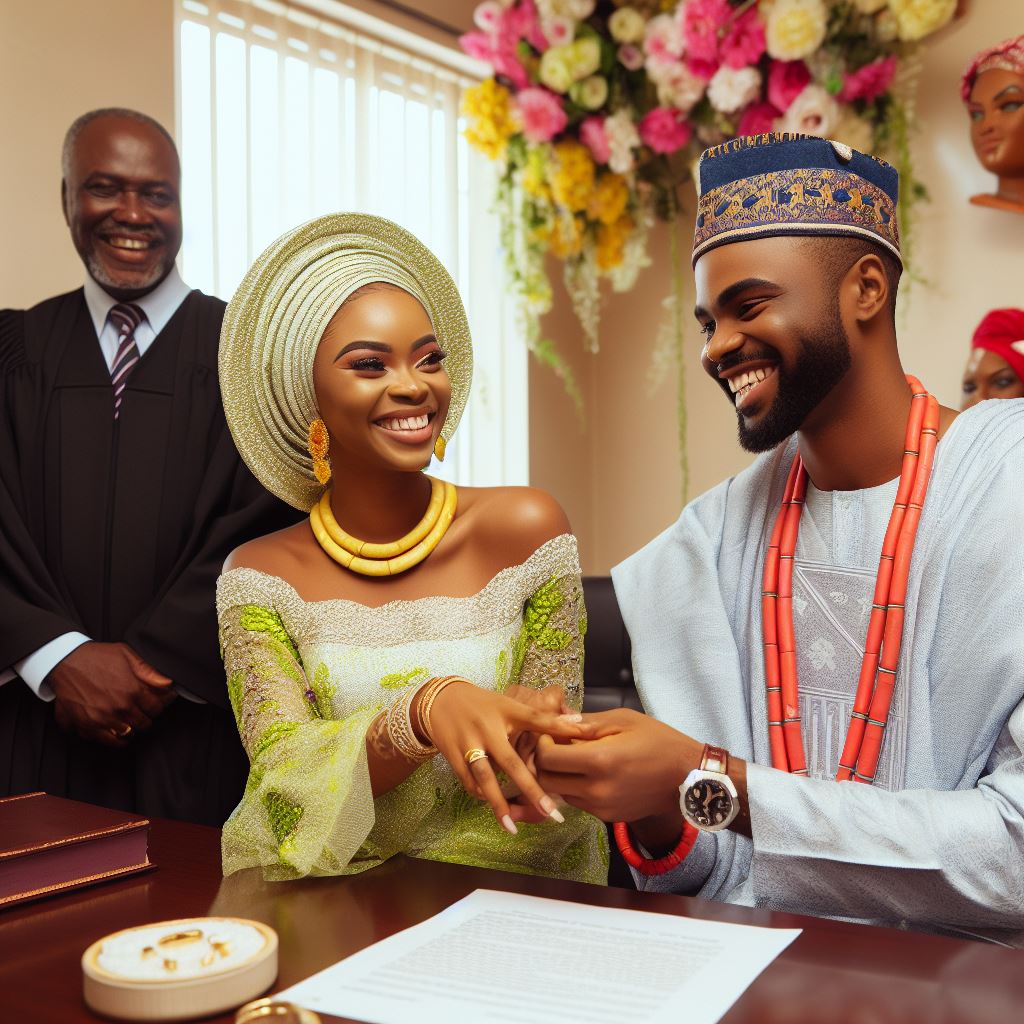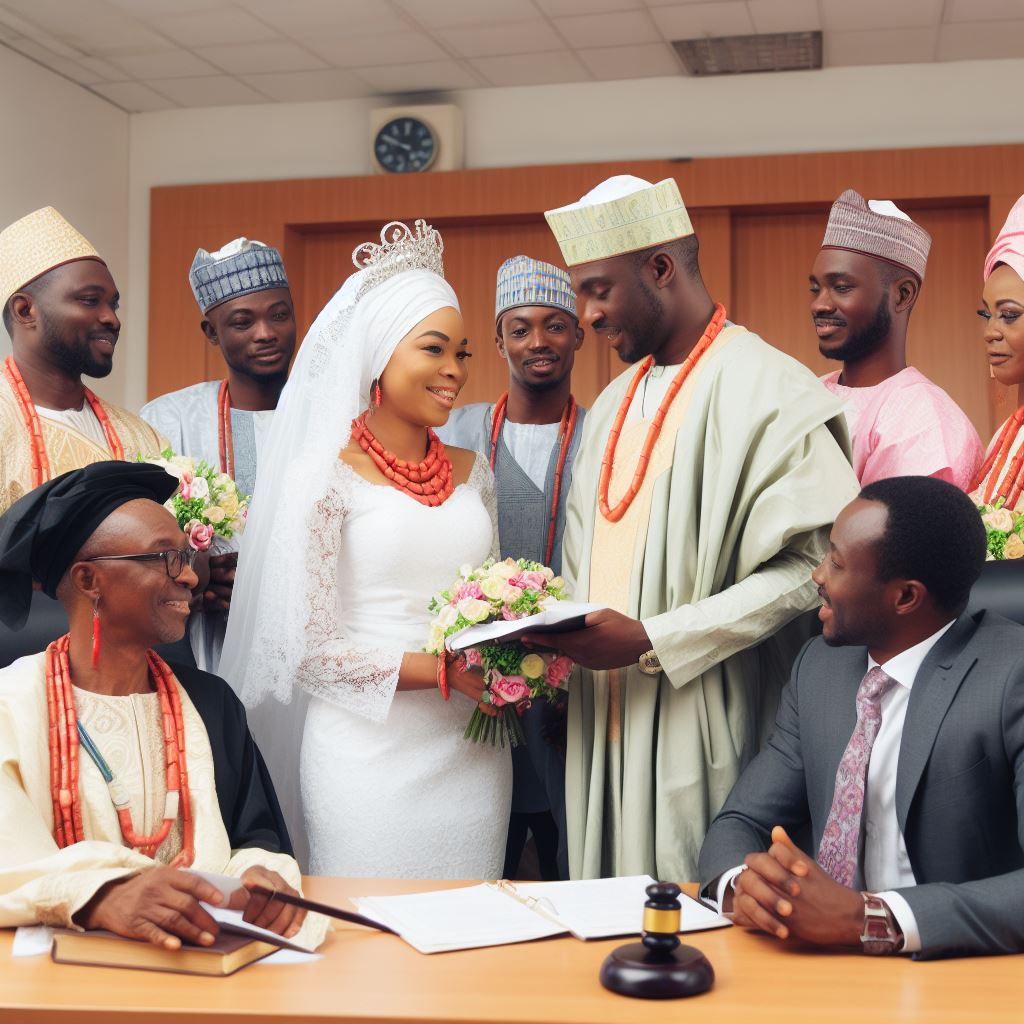Introduction
Marriage holds great importance in Nigerian society, as it is not only a personal commitment but also a cultural and legal union.
Traditional marriages, also known as customary marriages, are deeply rooted in Nigerian customs and traditions.
These marriages often involve elaborate rituals and ceremonies that symbolize the union of two families.
On the other hand, statutory marriages are recognized by law and follow legal procedures.
Differences between traditional and statutory marriages in Nigeria
One of the significant differences between traditional and statutory marriages in Nigeria is the legal recognition.
Statutory marriages are celebrated in accordance with the Marriage Act of Nigeria and are legally binding.
They are registered with the appropriate government authority, and couples receive a marriage certificate as proof of their union.
In contrast, traditional marriages may not have legal recognition unless registered under the customary law of a particular ethnic group.
The lack of legal recognition can have implications concerning inheritance rights, property ownership, and even child custody during a divorce.
Another distinction lies in the formalities and procedures.
Traditional marriages often involve intricate ceremonies and rituals specific to each ethnic group, showcasing their unique cultural practices.
These ceremonies can be time-consuming, involving the exchange of gifts, payment of dowry, and the participation of community members.
Statutory marriages, on the other hand, follow a simpler process.
Couples need to fulfill certain requirements, such as obtaining a marriage license, conducting a civil ceremony in the presence of a marriage registrar, and signing the marriage register.
The process is standardized and aims to ensure legal compliance.
Basically, the differences between traditional and statutory marriages in Nigeria extend beyond cultural practices.
While traditional marriages highlight the significance of customs and cultural heritage, statutory marriages provide legal recognition and protection.
Understanding these distinctions is crucial for couples seeking to enter into a marriage in Nigeria.
Read: The Role of Faith in Upholding a Sanctified Marital Relationship
Traditional Marriages in Nigeria
Traditional marriage customs and ceremonies
In Nigeria, traditional marriages are deeply rooted in cultural practices and hold immense significance for families and communities.
The customs and rituals associated with these marriages vary among different ethnic groups, showcasing the diversity and richness of Nigerian culture.
Bride price and dowry play a crucial role in traditional marriages, symbolizing the groom’s appreciation and commitment to the bride’s family.
Additionally, various rituals and ceremonies are performed during the wedding to invoke blessings and ensure a harmonious union.
Role of families and extended communities
Parents and extended family members hold significant responsibilities in traditional marriages.
They provide guidance, support, and blessings to the couple, ensuring a strong foundation for the marriage.
The inclusion of extended family members further strengthens the bond and represents the importance of community in Nigerian culture.
Marriage customs in different Nigerian ethnic groups
Different Nigerian ethnic groups have their unique customs and traditions surrounding marriage.
In Yoruba traditions, there are multiple steps involved, including introduction, engagement, and the main ceremony.
Igbo traditions emphasize the exchange of gifts and the breaking of kola nuts during marriage ceremonies.
Hausa traditions, influenced by Islamic practices, include the payment of dowry and the signing of a marriage contract.
Generally, traditional marriages in Nigeria reflect the cultural heritage of the country and hold immense significance for individuals, families, and communities.
The customs and rituals associated with these marriages vary among different ethnic groups, showcasing the diversity and richness of Nigerian culture.
Whether it is the bride price, traditional wedding rituals, or the involvement of families, traditional marriages in Nigeria continue to be treasured and celebrated.
Read: Advice for Newlyweds: Navigating the Journey with Hebrews 13:4
Statutory Marriages in Nigeria
Statutory marriages in Nigeria are marriages that are conducted and recognized under the law.
These marriages carry legal significance and provide certain rights and protections to the parties involved.
Laws and regulations governing statutory marriages
Under Nigerian law, statutory marriages are regulated by the Marriage Act of 1914 and the Matrimonial Causes Act of 1970.
These acts outline the legal framework for conducting and recognizing statutory marriages in Nigeria.
Requirements for statutory marriages
To enter into a statutory marriage, certain requirements must be met.
Firstly, both parties must be of a certain age and give their consent to the marriage.
The legal age for marriage in Nigeria is 18 years old.
Consent of parents or guardians may be required, especially if one or both parties are underage.
The registration process is a crucial step in obtaining a statutory marriage.
Both parties must appear before a registrar and provide necessary documentation and information.
This includes proof of identity, birth certificates, and any other required documentation.
Marriage certificates and legal documentation
Once the marriage is registered, a marriage certificate is issued to the couple.
This certificate serves as legal proof of the marriage and is recognized by Nigerian authorities.
It is important to keep this certificate safe, as it may be required for various legal purposes, such as obtaining a divorce or claiming spousal benefits.
Statutory marriages provide couples with legal protection and recognition.
They have the same rights and obligations as traditionally married couples.
In the event of a divorce, the Matrimonial Causes Act of 1970 governs the processes and procedures for resolving disputes and dividing assets.
Essentially, statutory marriages in Nigeria are conducted and recognized under the law.
They carry legal significance and provide couples with rights and protections.
The Marriage Act of 1914 and the Matrimonial Causes Act of 1970 regulate statutory marriages, and certain requirements must be met for a marriage to be considered statutory.
The registration process and issuance of marriage certificates are important steps in solidifying the legal status of a statutory marriage.
These marriages offer couples the same legal protections as traditional marriages in Nigeria.
Read: Nigeria’s Traditional Marriages and The Biblical ‘Honourable’ Union

Gain More Insights: Hausa Wedding Blessings: A Glimpse into Northern Nigeria
Differences Between Traditional and Statutory Marriages
In Nigeria, there are significant differences between traditional marriages and statutory marriages.
These differences can be categorized into legal recognition and protection, financial implications, cultural variations, and the influence of religion and modernization.
Legal recognition and protection
When it comes to legal recognition and protection, traditional marriages are considered customary laws.
They are recognized within the communities and follow specific cultural practices and traditions.
On the other hand, statutory marriages are legally binding unions that have been formalized and registered under the Nigerian Marriage Act.
These marriages are recognized by the government and afford certain legal rights and protections to the spouses.
Financial implications
Financial implications also differ between traditional and statutory marriages. In traditional marriages, the payment of bride price and dowry is customary.
The bride price is a sum of money or valuable goods paid by the groom or his family to the bride’s family as a form of appreciation and recognition.
Dowry, on the other hand, is a gift or inheritance given to the bride from her family.
In statutory marriages, the focus is more on joint property ownership and the division of assets in case of divorce.
These financial aspects are regulated by laws and may involve legal settlements.
Cultural variations
Cultural variations play a role in differentiating traditional and statutory marriages.
Traditional marriages often involve specific practices and rituals that are unique to certain ethnic groups in Nigeria.
These customs may vary in terms of the ceremonies, attire, and traditions followed.
Statutory marriages, however, are embraced by all Nigerians regardless of their ethnicity or cultural background.
This provides a sense of unity and uniformity across the nation.
Influence of religion and modernization
Religion and modernization also have an influence on traditional and statutory marriages.
Traditional marriage practices are often influenced by religious beliefs and cultural norms.
For example, in some ethnic groups, certain prayers or rituals are performed according to specific religious traditions.
On the other hand, statutory marriages are influenced by Western concepts and modern norms.
They are often conducted in a more formalized and standardized manner, similar to ceremonies seen in Western countries.
This reflects the changing societal values and the impact of globalization on marriage practices in Nigeria.
In essence, the differences between traditional and statutory marriages in Nigeria are significant.
These differences encompass legal recognition and protection, financial implications, cultural variations, and the influence of religion and modernization.
Understanding these distinctions is essential for individuals planning to enter into marriage and for society at large to ensure the recognition and preservation of diverse marriage customs and legal rights.
Read: Benefits of a God-Centered Marriage: Insights from Hebrews 13:4
Conclusion
Recap of the main points discussed
Throughout this post, we have explored the key differences between traditional marriages and statutory marriages in Nigeria.
We have learned that traditional marriages are based on cultural and ethnic customs, while statutory marriages are legally recognized unions.
Traditional marriages often involve elaborate ceremonies and require the payment of dowries, while statutory marriages require the couple to obtain a marriage certificate from the government.
We have also examined the rights and responsibilities that come with each type of marriage.
Traditional marriages may not offer the same legal protections as statutory marriages, and spouses in traditional marriages may encounter difficulties in accessing inheritance rights and other legal benefits.
Importance of understanding the differences between traditional and statutory marriages in Nigeria
It is crucial for individuals in Nigeria to have a clear understanding of the differences between traditional and statutory marriages.
This knowledge can help protect their rights and ensure that they are aware of the legal implications of their marriage.
Understanding the requirements and processes involved in both types of marriages can empower individuals to make informed decisions about their union and protect themselves and their families in the event of dissolution or disagreements.
Final thoughts
In Nigeria, both traditional and statutory marriage systems coexist and play important roles in society.
While statutory marriages offer legal protection and recognition, traditional marriages hold deep cultural significance and are integral to the country’s diverse traditions and heritage.
It is essential for Nigerian society to strike a balance between preserving its rich cultural traditions and ensuring that individuals have access to legal rights and protections.
By recognizing and respecting both traditional and statutory marriages, Nigeria can create a harmonious and inclusive society.




